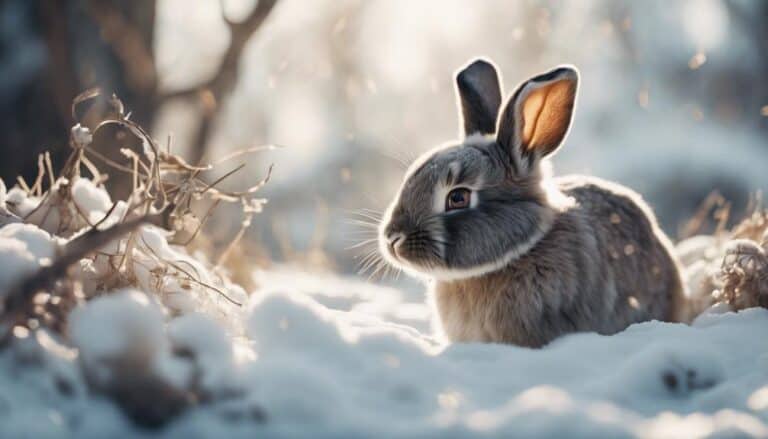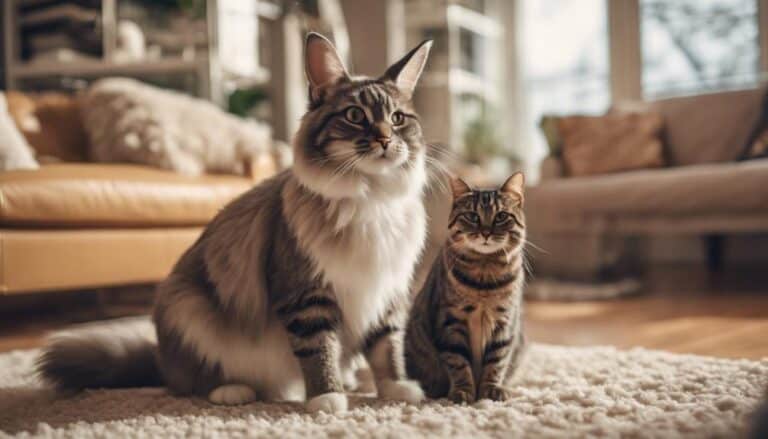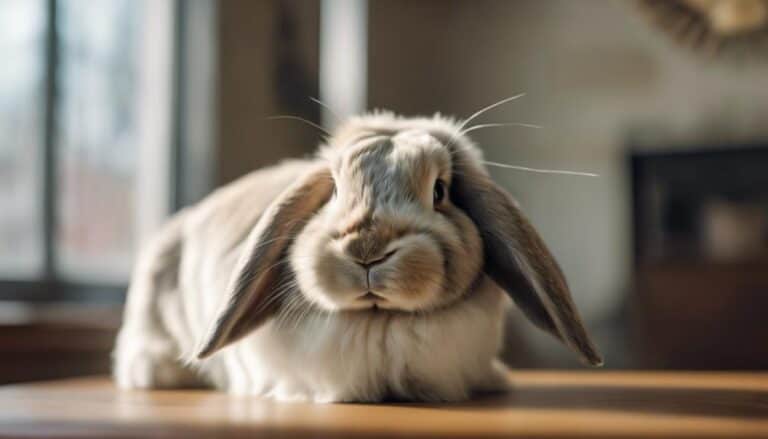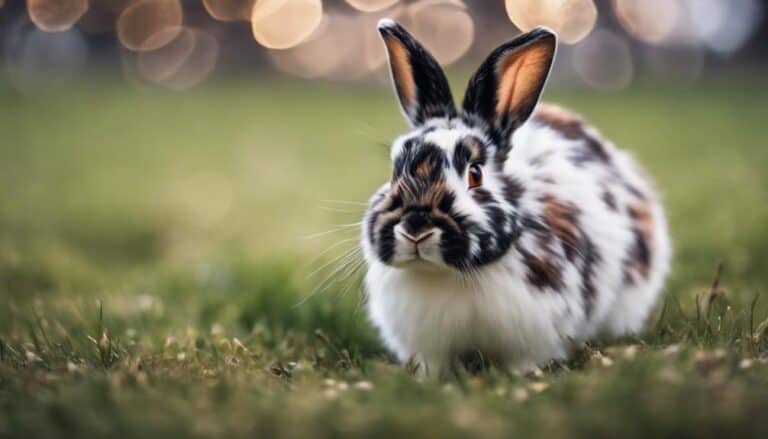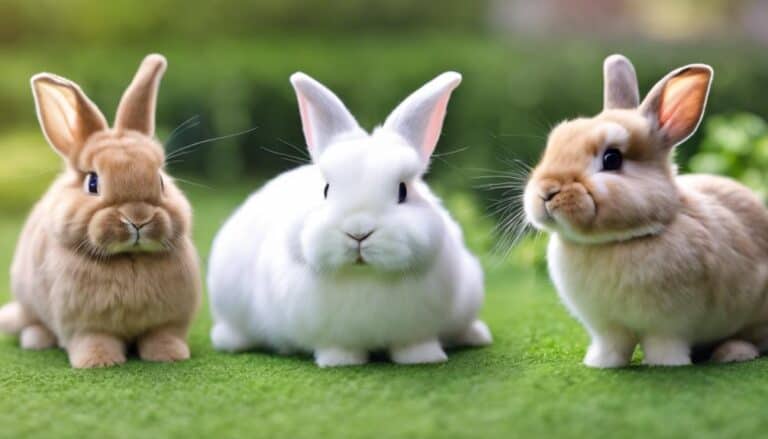When caring for American bunnies, watch out for parasites like fleas and ticks causing itching and skin troubles. Keep an eye on urinary issues; red urine from diet changes is different from bloody urine needing vet help. Look for cloudy urine as a sign of bladder sludge and note changes in their bathroom habits. Dental health matters; check for malocclusion and trim teeth if needed. Manage their weight with a balanced diet and exercise. Don't forget about GI stasis – it's essential for bunnies! Each health concern plays an essential role in keeping your furry friend happy and healthy.
Contents
- 1 Key Takeaways
- 2 Parasites in American Bunnies
- 3 Red Urine Concerns
- 4 Bladder Sludge Symptoms
- 5 Malocclusion in Bunnies
- 6 Managing Obesity in Rabbits
- 7 Preventing Heat Stroke
- 8 Dealing With Fractures
- 9 Tips for Handling GI Stasis
- 10 Can Training Help Prevent Common Health Issues in American Bunnies?
- 11 Conclusion
Key Takeaways
- Parasites like fleas and ticks can cause itching and skin irritation.
- Urinary concerns include red urine from diet pigmentation and potential blood.
- Cloudy white urine may indicate bladder sludge, requiring immediate vet attention.
- Dental health issues like malocclusion need regular vet checks for trimming or extraction.
- Obesity management through a balanced diet, limited treats, and regular exercise is crucial.
Parasites in American Bunnies
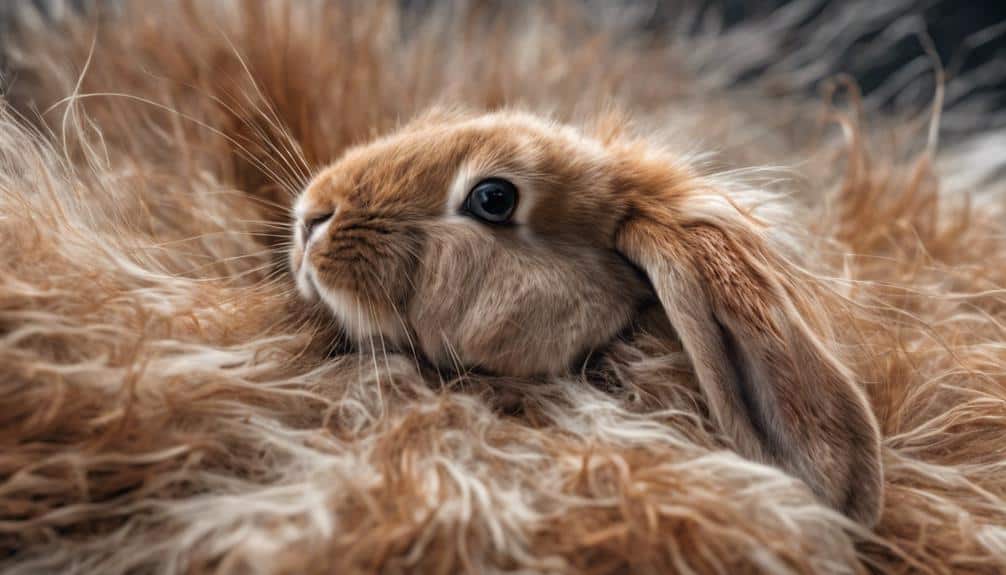
Parasites commonly affect American bunnies, with fleas and ticks being prevalent culprits, especially for those that spend time outdoors. These tiny pests can cause significant discomfort to your furry friend. Fleas, in particular, can lead to intense itching, which may result in hair loss and skin irritation. Regular grooming is essential to prevent and detect fleas early on. Ticks are another concern as they can transmit diseases to your bunny. Checking your bunny for ticks after outdoor playtime is important for their well-being.
Ear mites are another type of parasite that can affect American bunnies. These microscopic parasites can cause itching and discomfort in your bunny's ears, leading to head shaking and potential ear infections. If left untreated, ear mites could even result in a permanent head tilt. Regular vet check-ups are necessary to catch and treat parasites like fleas, ticks, and ear mites early on to make sure your bunny stays healthy and happy.
Red Urine Concerns
If you notice red strains in your rabbit's urine, it's important to promptly consult a vet to identify the cause and guarantee your rabbit's well-being. Red urine in rabbits is often caused by diet pigmentation rather than blood, resulting in red-tinted urine. While this is common, the presence of actual blood should raise concerns about potential health issues.
Seeking advice from a vet when you observe red strains in your rabbit's urine is advisable to rule out any underlying problems. Remember, red urine may not always indicate a serious condition, but it's essential to closely monitor your rabbit's health. Proper observation and guidance from a veterinarian can help determine the reason behind the red urine.
Bladder Sludge Symptoms
Cloudy white urine in your rabbit may indicate the presence of bladder sludge, a condition that requires immediate veterinary attention to prevent potential health complications. Recognizing the symptoms of bladder sludge is essential for maintaining your rabbit's well-being. Here are some key signs to look out for:
- Cloudy Urine: If you notice that your rabbit's urine appears cloudy or milky, it could be a sign of bladder sludge.
- Changes in Urination: Pay attention to any changes in your rabbit's urination habits, such as increased frequency or straining during urination.
- Discomfort: Your rabbit may show signs of discomfort, such as lethargy, decreased appetite, or vocalizations when trying to urinate.
Immediate veterinary attention is critical if you suspect your rabbit is suffering from bladder sludge. By addressing this issue promptly, you can prevent further complications and ensure your rabbit receives the necessary care to recover effectively.
Malocclusion in Bunnies
Identifying the signs of malocclusion in your bunny is important for maintaining their dental health and overall well-being. Rabbits' teeth grow continuously, and malocclusion can occur when the teeth don't wear down properly due to diet issues or lack of dental care. This condition can lead to dental disease, causing pain, difficulty eating, and even infections in your bunny's mouth.
Regular veterinary check-ups are essential to monitor your rabbit's dental health and address any signs of malocclusion promptly. If left untreated, malocclusion can significantly impact your bunny's quality of life. Treatment for malocclusion often involves teeth trimming or extraction to make sure that your rabbit can eat and groom comfortably.
Managing Obesity in Rabbits
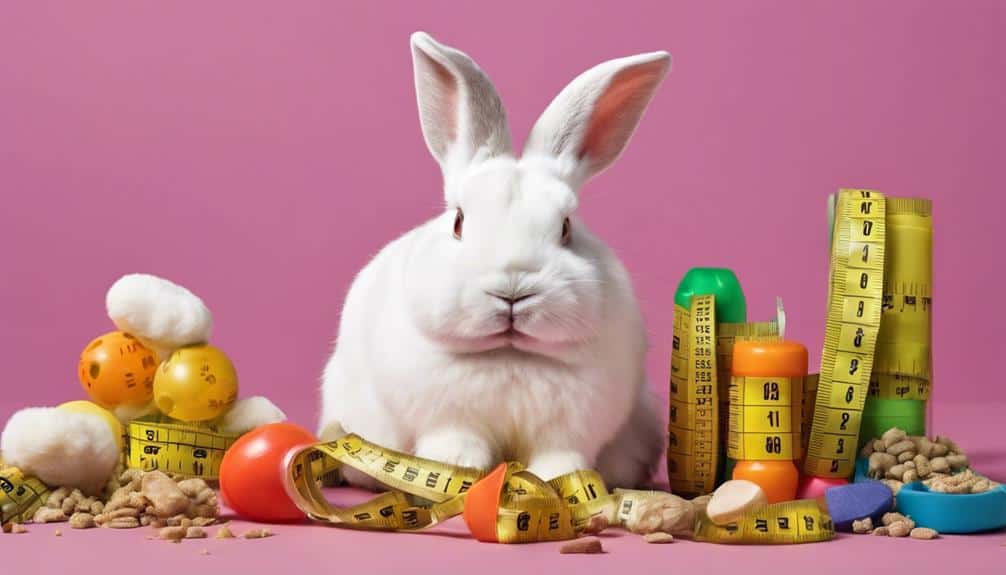
To effectively manage obesity in rabbits, prioritize a balanced diet rich in timothy hay to prevent serious health issues and secure a long, healthy life for your furry companion. Ensuring your pet rabbit maintains a healthy weight is vital for their overall well-being. Here are three essential tips to help you manage obesity in rabbits:
- Balanced Diet: Provide a diet that consists of 80% timothy hay along with fresh vegetables and a limited amount of pellets. Avoid high-calorie treats and sugary foods to prevent unnecessary weight gain.
- Limit Treats and Exercise: Limit the number of treats you give your rabbit and encourage regular exercise. Create a safe space for your bunny to hop around and stay active to help burn off excess calories.
- Regular Monitoring: Keep a close eye on your rabbit's weight and body condition. Regularly assess their body shape and adjust their diet and exercise routine accordingly to prevent obesity-related health issues.
Preventing Heat Stroke
You can keep your bunny safe from heat stroke by providing cooling techniques like frozen water bottles or ceramic tiles for them to lie on.
Watch out for signs of heat stress such as panting, drooling, or lethargy, as immediate action is vital to prevent serious complications.
Cooling Techniques for Bunnies
To help your bunny stay cool and prevent heat stroke, make sure they have access to shaded areas and provide cooling tools like frozen water bottles or ceramic tiles. Bunnies are sensitive to high temperatures and can quickly succumb to heat stroke if not properly cared for.
Here are some essential cooling techniques to keep your bunny safe and comfortable:
- Shaded Areas: Guarantee your bunny has access to shaded spots where they can retreat from direct sunlight.
- Frozen Water Bottles: Place frozen water bottles in your bunny's living space to provide a cooling surface for them to lean against.
- Ceramic Tiles: Ceramic tiles stay cool and can be placed in your bunny's enclosure for them to rest on and regulate their body temperature effectively.
Signs of Heat Stress
Recognizing the signs of heat stress in rabbits is essential for preventing heat stroke and ensuring their well-being during hot weather. Heat stroke can be fatal for rabbits, making it vital to provide them with access to cool areas and shade. Here are some signs that your bunny may be experiencing heat stress:
| Signs of Heat Stress |
|---|
| Panting |
| Lethargy |
| Drooling |
| Seeking cool areas |
Monitoring your rabbit for these symptoms and promptly moving them to a cooler environment can help prevent heat stroke. Remember, keeping your bunny in a shaded and cool area is critical to their health during hot temperatures.
Dealing With Fractures
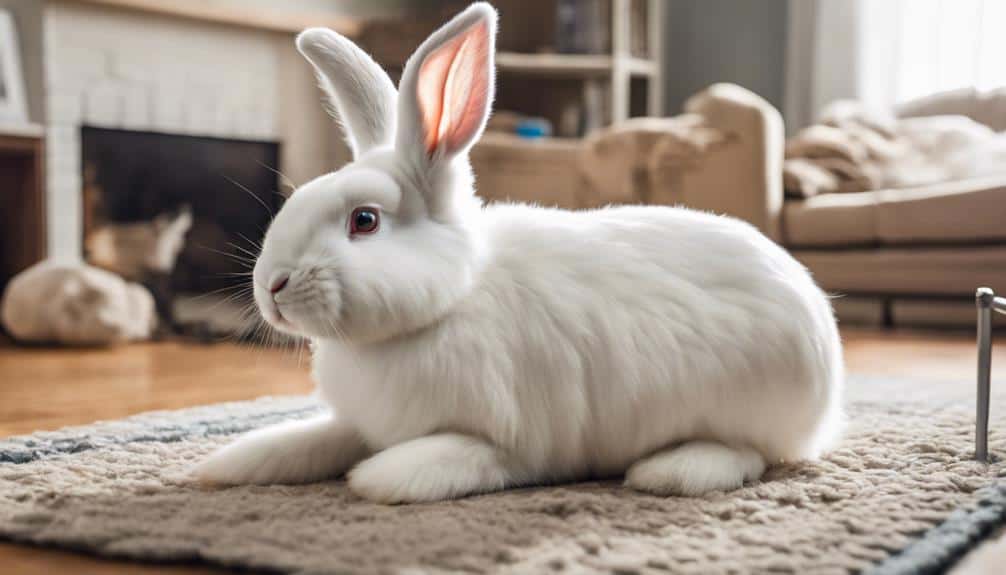
When addressing fractures in rabbits, it's essential to handle them with extreme care and gentleness to avoid exacerbating their delicate bone structure. Rabbits are prone to fractures, especially when not handled properly. Here are some important steps to help you deal with fractures in rabbits:
- Seek Veterinary Care: If you suspect your rabbit has a fracture, seek immediate veterinary care. A professional can provide the necessary treatment and advice to aid in the healing process.
- Keep Your Rabbit Comfortable: Make sure your rabbit is kept in a quiet, warm, and comfortable environment to reduce stress and promote healing.
- Follow Treatment Plans: Adhere to the treatment plan provided by your vet, which may include pain management, restricted movement, and potential surgery. Consistent care is essential for your rabbit's recovery.
Tips for Handling GI Stasis
If your bunny is showing signs of reduced appetite or lethargy, it could be a sign of GI stasis – a serious condition that requires immediate attention.
Ensuring your rabbit has a well-balanced diet rich in fiber, along with regular veterinary check-ups, can help prevent GI stasis from occurring.
Quick action and proper care are key to addressing GI stasis and avoiding potentially life-threatening consequences for your furry friend.
Prevention Through Diet
To prevent GI stasis in rabbits, make sure their diet is rich in fiber, primarily sourced from timothy hay, to maintain excellent digestive health. Here are some tips to help you guarantee your bunny's diet promotes a healthy digestive system:
- Provide a diet high in fiber: Aim for 80% of their diet to come from timothy hay to support proper digestion.
- Offer fresh vegetables and limited pellets: These additions help maintain a balanced diet essential for ideal digestive health.
- Ensure access to fresh, clean water: Hydration plays a significant role in preventing GI stasis, so make sure your bunny always has water available.
Veterinary Care Importance
Maintaining your bunny's health when dealing with GI stasis requires prompt and attentive veterinary care to address potential complications effectively. GI stasis can quickly escalate, leading to life-threatening complications if not treated promptly. Immediate intervention by a veterinarian is vital, involving treatments such as fluids and medications to combat reduced food movement and dehydration.
Additionally, GI stasis can disrupt the balance of GI bacteria in rabbits, making veterinary care even more essential. Regular monitoring for signs of GI stasis and quick action are key in ensuring a full recovery for your bunny. Expert guidance from a vet on adjusting your rabbit's diet and providing proper medical management is essential for effectively managing GI stasis and promoting your bunny's well-being.
Can Training Help Prevent Common Health Issues in American Bunnies?
Proper training tips for bunnies can help prevent common health issues in American bunnies. Training can aid in promoting physical activity and mental stimulation, reducing the risk of obesity and dental problems. By teaching bunnies to exercise and eat a healthy diet, owners can contribute to their overall well-being.
Conclusion
To wrap up, keep in mind that the health and well-being of your American bunny is of utmost importance. By being proactive and staying informed about common health issues, you can guarantee your furry friend lives a long and happy life.
So, keep an eye out for any signs of:
- parasites
- bladder sludge
- malocclusion
- obesity
- heat stroke
- fractures
- GI stasis
Your bunny will thank you with endless cuddles and binkies for taking such good care of them!

